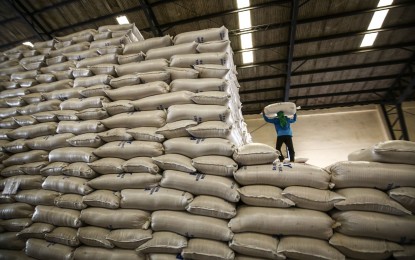
TARIFF CUT. A worker at the National Food Authority warehouse in San Ildefonso, Bulacan carries a sack of palay (unhusked rice) in this June 7, 2024 photo. Camarines Sur Rep. Luis Raymund Villafuerte Jr. on Tuesday (June 25) said the approved tariff cut on imported rice would set in motion President Ferdinand Marcos Jr.'s goal to bring down the retail cost of the staple to below PHP30 per kilo. (PNA photo by Joan Bondoc)
MANILA – A lawmaker on Tuesday said the approved tariff cut on imported rice would set in motion President Ferdinand R. Marcos Jr.'s goal to bring down the retail cost of the staple to below PHP30 per kilo.
In a statement, Camarines Sur 1st District Rep. Luis Raymund Villafuerte Jr. said Executive Order (EO) 62 is a "welcome development" as it reduced the tariff rate on imported rice from 35 percent to 15 percent in-quota and out-quota.
"The unhampered implementation of EO 62 will get going the process for rice prices to go down below PHP30 a kilo, at least to poor and low-income consumers, as projected by our economic managers," Villafuerte said.
He appealed to certain farmers’ groups that are set to file a temporary restraining order (TRO) against EO 62 to “reconsider and give up their planned legal action" considering that agricultural workers will benefit from cheaper rice "as they themselves are main consumers of this staple.”
Twelve groups, including Samahang Industriya ng Agrikultura, bared plans over the weekend weekend to file a TRO before the Supreme Court to prevent EO 62’s effectivity on July 6.
Aside from the EO, Villafuerte said the bill amending Republic Act (RA) 11203 or the Rice Tariffication Law would help reduce rice prices further.
He said with the proposed amendment that will allow the National Food Authority to import rice again or buy the harvests of local farmers, the agency can effectively intervene in the market by selling cheaper rice, particularly to poor or low-income consumers, whenever domestic prices are "unusually high.”
Speaker Martin Romualdez has assured Filipino farmers that they will receive substantial support through government subsidies, allaying their concerns about the reduction in tariffs on imported rice.
“Napaka-importante (It is very important) for farmers to get all the support and the subsidies that we could provide para makahabol din tayo na maging (so we can achieve) rice self-sufficient,” Romualdez said.
House Committee on Agriculture Chair Mark Enverga and Committee on Appropriations Chair Elizaldy Co said the reduction of tariffs under EO 62 will not jeopardize the welfare of local farmers.
Enverga noted that substantial funding is allocated for agricultural support and the projected requirements to sustain RCEP initiatives for 2024.
The current RCEF, also known as the Rice Fund, allocates PHP10 billion annually from tariff collections on rice imports to finance farm mechanization, provision of better seeds and training on new farming technologies.
Co cited ongoing initiatives by the National Irrigation Administration, which has started contract farming expected to yield 200,000 metric tons of rice, with sales ranging from PHP29 to PHP34 per kilo.
Co also pointed out the introduction of solar fertigation systems, which are projected to increase rice production by 80 percent at no additional cost to farmers. (PNA)
